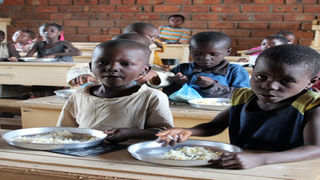
Children eat a mix of rice and corn during a food distribution by the Word Food Programme (WFP) on July 7, 2014.
| FileNews
Premium
Tough times ahead for refugees as WFP cuts food rations
A shortfall in donor assistance is forcing another eight per cent reduction in food rations this year for refugee camps in the country, the United Nations has said.
The cutback, which will be implemented in the coming two weeks, means that 440,000 refugees in Dadaab, Kakuma and Kalobeyei settlements will no longer receive the recommended minimum daily intake of calories.
This means that the refugees will either eat less or skip meals after the World Food Programme announced that come October, it is going to reduce supply from 60 per cent last year to 52 per cent.
If six people out of 10 were receiving food, then it means that, in the next two weeks, only five will be receiving.
The situation will be worsened by the ongoing drought and hunger that is currently being experienced in the host community Turkana County, with many in need of relief supplies and access to health care.
Some communities are also beneficiaries of the relief with many families who are hunger-stricken now migrating to other counties in search of food and water.
According to an insider at the camp, the reduced food rations will mainly affect thousands of children who are likely to miss vitamins and minerals, which could result in a rise in malnutrition.
The humanitarian agencies in the region say more than Sh3 billion is required to feed the refugees for the next six months.
The refugees require cereals, legumes, vegetable oil and nutrient-enriched flour for a balanced diet.
“I know we have had issues with funding, but it was not the right time to ration the food, the community outside the camp are now suffering. There is no food, some depended on relief food,” says the insider.
The announcement letter written to the camp project managers stated that insufficient funding over an extended period of time has been a challenge affecting all the agencies.
In Kenya, as a result, the WFP has been progressively reducing the general food ration scale from 85 per cent in 2016 to 60 per cent of the minimum food basket in 2020.
Additionally, the ration for prevention of malnutrition was reduced to 67 per cent of the recommended ration in July 2021.
The announcement made by WFP Kenya Representative and Country Director Lauren Landis stated that the programme has had to make further rationing in a bid to stretch available resources.
The ration cut will take effect from October 2021, when the next double month distribution for in-kind food will be done, while the ratio for the acute malnutrition prevention programme will remain at 67 per cent.
World Vision distributes food at the camp in partnership with the WFP.
“I appreciate this change will cause considerable concern which we share. WFP will continue to engage vigorously with the donors to secure sufficient funding to enable the provision of the recommended levels of food assistance,” Dr Landis said.
An assessment done by WFP last year on food security in urban areas (Nairobi, Mombasa, Kisumu) discovered that there was a very high rate of food security.
Kenya government had earlier announced the closure of the two refugee camps – Dadaab in Garissa County and Kakuma in Turkana. The camps have been controversial, with Nairobi accusing some inhabitants of fomenting terror in the country.
A High Court decision suspended the plans to shut it down.
US Secretary of State Antony Blinken implored Kenya to relax its planned closure of refugee camps as Washington promised more funding to help those fleeing trouble in the region.
Mr Blinken, who met virtually with President Uhuru Kenyatta, called for more cooperation on security, health and human rights.
Mr Blinken said the US had provided $106 million (Sh11 billion) for refugee protection and humanitarian assistance to Kenya “as it provides regional leadership by hosting refugees and asylum seekers from Somalia, South Sudan, the Democratic Republic of the Congo, Ethiopia, and elsewhere.”





